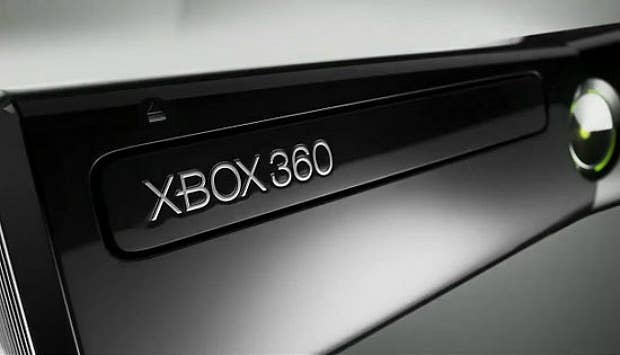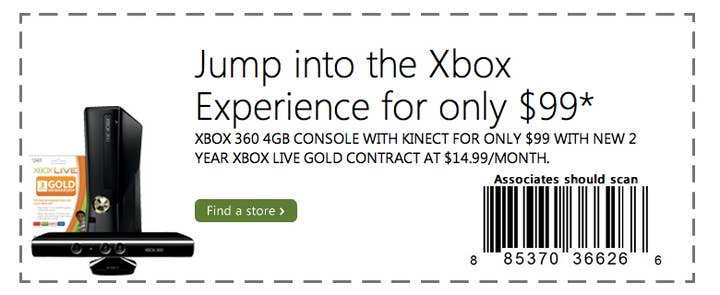Microsoft sees Xbox becoming "entertainment platform for everyone on the planet"
We sit down with the corporate vice president of Microsoft Studios to talk about all things Xbox
Microsoft's E3 showing this year didn't offer any huge surprises, but the content to satisfy the core was certainly there. More importantly, from a global business viewpoint, Microsoft is continuing its march into living rooms everywhere. The company makes no bones about it - with Xbox TV, Music, Kinect integrations and more and more video partnerships, the Xbox platform is quickly becoming a well-rounded entertainment center for gamers and non-gamers alike.
Following the press conference, GamesIndustry International met with Phil Spencer, corporate vice president of Microsoft Studios, to discuss the evolving Xbox strategy, the competition, Halo 4, the role of Kinect and much more.
I think, to not not answer your question, it is worth noting that there is another competitor that is not here that has a developer's conference next week (after E3).
Right, so if we think about where our ambition is, our ambition is to create an entertainment platform for everyone on the planet. We think there are a couple keys; having unique content on our platform. We started off with Halo, but we obviously have a breadth of content on our platform from big core games to things like the Nike fitness program that we showed, to things like Dance Central and our sports offerings. It's a real breadth of content on the platform. Live and the connected service is pretty key to what we do.
The partnerships that we're able to drive I think are important. I'd like to point out Nike yet again; it's them talking about what we do as opposed to us talking about us. It's nice, really validating to have a worldwide brand like Nike come out and decide that this is the system that they want to go and innovate on and we can go and create something that is uniquely different.
"If you look at our top franchises in our first-party, they do incredibly well relative to other first-party franchises"
Phil Spencer
No, our SmartGlass was driven by the fact that people use multiple devices at home to consume content. Whether they're watching TV with their laptop up or sitting with their phone while browsing the web, we could use the power of Live to connect all these devices in an intelligent way and turn your TV into a smart TV. Your specific question on the other press briefings, I went to EA, Ubisoft, Nintendo and Sony and ours. Things that I thought and I am more of a positive than a negative; things I liked were ZombiU, they were nice enough to let me play. I thought that game played very well, and I saw the use of another screen and how that would work.
I think their Pro Controller makes a lot of sense with the platform they've built. They are building a platform that is effectively a 360 when you think of graphical capability. Now they are really making an on-ramp for the back catalog of games that are on 360. It is easy for those games to move over the Wii U. They've moved the buttons around, and they've made a controller that feels familiar for 360 gamers, so I get why they are putting those pieces together. I would have loved to see Zelda or Metroid or some of my favorite Nintendo franchises, which I didn't see.
For Sony, Sony has a big first-party. I didn't get a sense of what all their first-party studios are working on, but I thought God of War looked good. It's a franchise I like, I love the character and I think they do a good job with that. We are here to create entertainment, and we look at E3 and really wanted to create a breadth of content there. I felt good about how we showed up to really think about young, old, male, and female. We have more gamers than we ever have, whether they are on their phone, tablet, PC or console. We really want to embrace that huge community of gamers out there.
I don't know if Microsoft cares - I work for Microsoft after all - but I own a Vita, I own a Wii, I own a PS3, and I play a lot. At the core, I'm in this industry because of the content we create and the experiences. I think there are great experiences that come from all over. I don't try to claim that everything that is ever created is something that we touch, that would be somewhat ridiculous.

So that is two separate questions. We have always been about trying to create hits that really push our platform and reach millions of people. I've never looked at our first-party mandate as trying to simply pump out content that only a few select people will go out and buy. If you look at our top franchises in our first-party, they do incredibly well relative to other first-party franchises. If you rank our top four franchises against the other franchises, our top 4 outsell like the top 11 Sony franchises or something like that. In the end, it's about creating something to scale and something that matters.
I also look at the great third party support that we have and I don't need to go compete with Batman or Call of Duty or Assassin's Creed that shows up on our platform. It's great that we got Warner Bros, EA, Activision and Ubisoft making a lot of money on our platform and bringing great content. So we take our first-party and we try to do unique things. We focused early on Kinect with quite a few things because we knew that third-parties might have taken a 'wait-and-see' attitude. They actually didn't. There were more third-parties on stage this year with a lot of Kinect content this year.
First-party is going to invest early in a lot of things. We actually have over 30 launch games on the Windows 8 tablets coming from first-party. Now we're starting to build on SmartGlass, and that thinking with a lot of connections between different screens, I think will pay off. I've never really looked at first-party as simply a portfolio filler strategy. I want to pick some things that will really differentiate, whether it is working with ESPN and Nike to create something new, or Sesame Street or making a great Halo game which we are right in the middle of being born. It's showing very well right now.
"Halo plays to its strengths of character and story and setting... I'm not saying Call of Duty doesn't have story or setting, but the nature of the franchise is that you don't have iconic characters living from game to game"
Phil Spencer
The nice thing about where Xbox sits is that is the number one console, globally. Don [Mattrick] made the proclamation last year that our goal was to be the number one console, and we did it. We have a lot ahead of us, but it is a good beat along the path. There are a lot of gamers in the Xbox 360 ecosystem right now, a lot of online gamers and a lot with platforms. There is plenty of room for a lot of great blockbusters to live next to each other.
Halo and Call of Duty to me are different games. Halo plays to its strengths of character and story and setting. I think those are some unique things. I'm not saying Call of Duty doesn't have story or setting, but the nature of the franchise is that you don't have iconic characters living from game to game. They focus a lot more on situations and great fidelity on set piece. That's always been the core of the franchise. I like seeing the creative bar get raised; we've done Spartan Ops this year in Halo 4. 343 Industries has done a great job reinventing some of the online gameplay for Halo. I'll add that Battlefield is a great competitor in that space as well. It's a win for the gamers.

Bungie is a studio that I have a great relationship with, and continue to. Their studio is a mile from my house, so I see them a lot. I'm really excited to see what's coming next from them. I've been in Studios since the beginning of Xbox, so it's good that Bungie is working on something new. That's where their passion is and I think their next product and their studio will be better for doing something new.
The best part about 343 is while it is challenging and risky, you are able to hire a studio that has the sole mission of taking on this great franchise and elevating it to the top of the stack, and that's what those people are driven to do. That's why we opened our conference this year with that Halo 4 video. I get a sense of pride that the people behind the scenes are dumping their hearts and souls into making it happen. They are all in to making this. They are committed to making great games and a great Halo. They are committed to that, and while it is a risk, it is a good thing. It's a great proof point on their path to shipping.
Well, Wreckateer, Fable and Nike are more motion control, but I'm not arguing with you on that. I think voice is magical.
That's right. We also showed using voice in Madden and FIFA. Early on, we thought that Kinect would find its way into every game on the 360 because there are just some natural components like the RGB camera, the mic for voice or the camera for gesture. There is enough diversity in what it does that you find it is just more natural to yell 'hey you' at one of the Splinter Cell AI characters and have it turn around rather than hit the 'hey you' button. That doesn't make sense. There are these immersive mechanics that are more complete.
I think you are hitting on something smart; I've said this a couple times that I don't get these kinds of questions about "where did the 'Kinect section' go?" Previously, and because it was new, we had to explain it. Now you just find that Kinect finds its way into the experience in natural ways. You don't think of it as a Kinect thing. Of course Nike Fitness uses Kinect, but it finds its way into the experiences. It's less of a specific, remarkable experience, and more about how do I feel about Nike, or how do I feel about Wreckateer. Most people talk about how fun the game is and what they feel about the game, not that it is Kinect even though it is obviously a Kinect game.
Let's be careful when we say there is that desire. If I'm an owner of an Xbox, it is an amazing time. I've got Halo, Call of Duty, TV showing up, Nike, Sesame Street, and I mean the platform has reached a scale now that you see a diversity of content that you really do have something for everyone on the box. You have video consumption outpacing online gameplay now, but both are growing. The Xbox is just on more hours in the home. From a value perspective, I think people feel great about the investment they've made in the Xbox. We've introduced the Live plan and the $99 Xbox which is going well.
So when we say people are interested in the next, there is a sub-set of people that are always wondering what is next and even the next, next. That's great enthusiasm, but we don't want to turn it into the world is somehow waiting. We see that the 360 is in the number one position, we have a ton of engagement, games are selling really well, Live subscriptions are going well and it's an opportunity for content creators to ship content into a huge installed base that are actively engaged. That's a great opportunity.
For us, it is about trying to reach different price points. We've seen this historically and you can look all the way back to the PS2 and look at where it took off, at the magic price point in this ecosystem. Xbox is now at a point, both from a content perspective as well as our goals of growing that installed base, where international expansion becomes incredibly important. I thought Yusuf [Mehdi] doing our Spanish demo [for Kinect] was pretty magical. We're showing our focus on growing and succeeding on a global basis, not just with the core 'buy a disc and plug controller in' but with all the functionality that exists on the platform.
Even in markets where we've had success, there are people that look at lower price points as their entry point into the platform. That's what we're trying to do, and we recognize that. We think that the best experience on Xbox is to be subscribed to Gold, and if you capture those two things together, you will bring on new people, which is an opportunity for everyone.

Yeah, but let's be careful. Our first launch was in Microsoft stores and that was a trial as we've never done it before. Is it going to work? We kind of wanted to pick five people and ask them how they liked it. We started off small so we could actually figure out how the opportunity worked. I walk in and I see a console with the Live subscription, how does the consumer react? Obviously the fact that we're rolling out to big retail partners like Best Buy and GameStop shows that our initial reaction was strong on a trial basis, and now we want to go and take it more mainstream. We're finding that consumers are finding it to be a real value.
I think that's kind of missing the point. There are a couple customers for the subsidized Xbox. You can think about someone who is brand new and never owed an Xbox. We've hit a price point that at $99 that is affordable to them, and they look at the value that gaming is to them, and we've hit that value. We're definitely not trying to turn it into something else.
The other people are maybe buying their third or fourth Xbox for the home, and they already subscribe to Xbox. They want to use these Xbox consoles for TV, and they want to make it the way they control their TVs in the home. When you get that kind of consumer, you really get a high consumption customer that wants the newest thing. Those higher usage consumers are probably going to come into something new anyways. There is no strategy to bridge with that - it simply is to find that value customer.
The term indie does not necessarily mean 'small.' Some of the most independent studios I've ever met are some of the largest studios I've ever met. I think if what we're saying is if there is content available for Xbox at multiple price points, both from what it costs to build the content and buy the content, or does everything have to compete at $60 and beyond? I'm really happy with the different price points that we see on Xbox; we just put out Minecraft last month and sold 2 million units. Trials came out and did incredibly well. Further down on price point, I'm playing The Walking Dead, which is an episodic game for $5 or so, forgot the exact price. We have price points for content across the 360.
The nice thing is we have successes at these different prices; there are real businesses that can be made at the different levels that are available. That's a strength of the Live marketplace. I know you aren't really asking, but we have Windows 8 coming out this fall, and we have over 30 games coming at launch and that is another market right there. As we start to connect Xbox games and Xbox music and video across all these screens, it will create more opportunity for size and scale of this content.
"On our side, future of entertainment is the cloud. You see that with music and movies, and games will be that way as well"
Phil Spencer
That's a good question. We have a dedicated team inside of Studios that is focused on Windows. We have over 30 games at launch with a variety of genres, price points and business models. We have a steady flow of content that is coming out; I think Windows 8 is a huge opportunity for the company and gamers just to see new things get created. We've acquired some studios such as Twisted Pixel and we've just announced Press Play which was an acquisition of a company we worked with on Windows Phone, who have done great IP creation. They did Max and Magic Marker and Tentacles. We see an opportunity and I think the Windows opportunity is huge. For us as a company it is very important.
You are also smart in thinking of that Xbox connection. Xbox is a brand. You have Xbox SmartGlass across all these screens; Xbox games on my Windows phone, Xbox music, Xbox video and it's a big focus. The nice thing on the floor, you see Wargaming down the hall with World of Tanks; I mean they have a huge booth for a free-to-play game - that's great. You see these games, and it is a great PC game, and they are able to get to scale with the business they attract. It is a healthy ecosystem and the launch of Windows 8 will push it forward. Diablo came out, League of Legends; you have some big things that are driving huge businesses for people on Windows, and we are going to be there in full force with Studios, there is no doubt about that.
To be honest, I think it is at an incubation period. I think Gaikai is doing great work and I'm not downplaying what they've done, but it is not yet at global scale where you can promise someone that when they buy this TV and plug it into their own internet connection that they are going to get a reliable service that a normal, non-technical person would accept for playing all types of games. We're a scale company, we want to make a promise that we can actually reach everybody. Anybody can buy a Kinect, plug it in, and it will work. I think cloud is in the future, there is no doubt about that. And as a company, Microsoft has Azure; we have data centers, Office 365, Hotmail. There is no question about big data, large scale services that Microsoft has invested in.
On our side, future of entertainment is the cloud. You see that with music and movies, and games will be that way as well. I think we are a ways away from everybody being able to play all the games that we are showing off on the floor of E3 via the cloud reliably. We're involved in the investigations and the experiments, but I don't think it's at scale yet. It will be, but it is not an 'if,' it's a 'when.'









